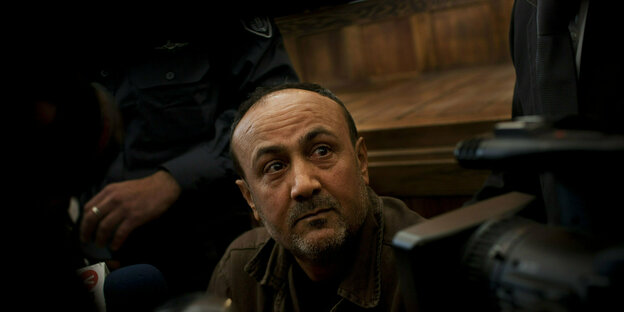Former Fatah Secretary General Marwan Barghouti is in prison for his role in terrorist attacks against Israelis. However, he could be released.

Marwan Barghouti has been imprisoned in Israel for more than two decades Photo: Bernat Armangué/ap
JERUSALEM taz | One name is causing a stir these days in the slow negotiations between Israel and Hamas on a ceasefire in the Gaza war: Marwan Barghouti. According to a report by the AP news agency, he is high on the list of those whose release the Palestinian terrorist organization wants to negotiate. Like no other, the Fatah man enjoys support on all sides. For many Israelis, release remains difficult to imagine: Barghouti is serving a long prison sentence for participating in terrorist attacks against Israelis.
There are good reasons why the release of the 64-year-old, who has been behind bars for more than two decades, has often been discussed but ultimately never implemented. An important one: Barghouti oscillates between politics and violence. Born in 1959 near Ramallah, he joined the Fatah party of Yasser Arafat, the later Palestinian president, at the age of 15.
At the age of 18 he was imprisoned for the first time. When the First Intifada, the popular Palestinian uprising, began in 1987, Barghouti was quickly expelled to Jordan for allegedly inciting clashes with Israeli security forces.
After his return, he rose to become secretary general of Fatah and assumed leadership of the Tansim paramilitary militia. When the Oslo peace process finally ended in the much bloodier Second Intifada in the early 2000s, Barghouti was arrested and convicted again. This time, as the mastermind of several deadly terrorist attacks, he received five life sentences and an additional 40 years.
“Palestinian Nelson Mandela”
Barghouti's path also includes his repeated commitment to peace with Israel and the two-state solution. He also enjoys the support of Palestinian society and, despite his imprisonment, regularly leaves all other political leaders far behind in the polls, such as Palestinian President Mahmoud Abbas and Hamas leader Ismail Haniyeh. Many Palestinians consider him upright, also because he denounced corruption as general secretary of Fatah in the 1990s. His time in prison also earned him the nickname “Palestinian Nelson Mandela” by many. He also spent a lot of time in prison before he, as a black president, brought about the end of apartheid in South Africa.
former head of Israel's Shin Bet domestic intelligence service, Ami Ajalon, told the newspaper. Ha'aretz in December that his country should free Barghouti. Only he can lead a “united and legitimate Palestinian leadership towards an amicable separation from Israel.” But Barghouti has also fought violently against Israel repeatedly. His release would likely provoke outrage among many Israelis. He himself last called from his cell in December to participate in the current Palestinian “liberation campaign.”
Israeli Prime Minister Benjamin Netanyahu and his partly far-right government have proven in recent weeks to be anything but interested in talks on a two-state solution. Instead, the head of government periodically repeats that the agreement will not be reached “at any price” or in exchange for “thousands of terrorists.” However, Netanyahu has not explicitly ruled out the release of Barghouti and other well-known Palestinian leaders.